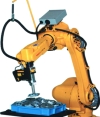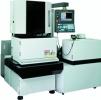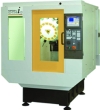
The name FANUC, synonymous with factory automation (FA) and robotics, began in 1956 when the Department of Fujitsu Electronics was charged with the task of developing an automated punch press with the first numerical control (NC) device, the first commercial FANUC NC being shipped in 1958. This article looks at the evolution of FANUC and specifically its South African subsidiary, FANUC South Africa (FANUC SA).
Following the commercialisation of the first numerical control (NC) device in 1958, 1959 saw the first electro-pulse motor and the first continuous path NC developed by FANUC. A decade down the line in 1972, Fujitsu FANUC was created as an independent company. In 1974 two major events occurred with the development of the first DC servomotor and the first FANUC industrial robot, and in 1986 a Memorandum of Agreement was signed with General Electric (GE) to see the formation of the GE FANUC Automation Corporation. Today, within the FANUC Group, independent subsidiaries include FANUC, FANUC Robotics and GE FANUC Automation.
FANUC - the company
The FANUC Group operates in a very competitive world, which requires continuous investment in R&D in order to stay at the forefront of its chosen niche markets. FANUC attains this goal through employing one third of its staff in R&D, focusing on the development of CNCs, servomotors and related application products. As FANUC's products are industrial (not consumer) goods, the highest priority is given to reliability, performance and cost competitiveness. Every FANUC engineer is acutely aware of the importance of rapid product development and the timely introduction of new products in the marketplace.
In search of market growth, FANUC installed automated manufacturing 'Robot cells' with 'intelligent' robots in its production facility. These Robot cells make the most of intelligent robot capabilities to identify and retrieve workpieces from warehouse storage and to mount these workpieces on their fixtures automatically. These advanced capabilities enable its Robot Cell Lines to operate continuously unmanned for more than 720 hours, including weekends.
FANUC has also recently built a new Servo Motor Factory capable of producing 100 000 servo motors per month, these being key components for all of its main products. By making use of FANUC's intelligent robots, this fully automated factory ensures that major FANUC products receive a significant boost in cost competitiveness. The FANUC production facilities are considered to be some of the most automated in the world, with all processes (from parts inspection to final testing) being automated.
Factory automation (FA)
The majority of CNC systems in the local machine tool market are supplied by FANUC. These can be found on imported or on locally manufactured machine tools. FANUC South Africa also supplies CNCs and power motion products for machine tool upgrades.
Besides the wide range of fully digital servomotors available, FANUC also manufactures a range of linear motors, which have no deforming elements such as ball screws and without wearing parts in mechanical structure. These systems realise high gain, higher rigidity and precision of the servo system, with a maintenance free mechanism. Additionally, rigid long stroke axis with increased thrust force and multihead configuration by arranging multiple coils on a single magnet track is easily available. FANUC linear motors achieve speeds of 4 m/s and maximum acceleration of 30G which is difficult to achieve using rotary motors.
Multipurpose intelligent robots
The capabilities of FANUC industrial robots has progressed rapidly with larger servomotors and faster controllers for more power, speed and agility. Robots need to be 'intelligent': autonomous, capable of making decisions, and adaptable to the surroundings. FANUC has developed 'intelligent' robots for more than a decade, having invested its resources in vision and force sensor development as an important tool to realise robotic intelligence. FANUC's intelligent robots are equipped with these sensors to recognise the position of an object, to grasp it, and to control the force used to grip or press the object. The robot also prevents possible collisions with objects in its work path. These capabilities have brought about a significant expansion in the application of robots to sensitive products and tasks.

FANUC manufactures a wide range of robots to meet the various requirements of its customers. Manufacturers have implemented robots in places where the tasks are repetitive, unpleasant or hazardous, the latter including paint shops and welding areas. Robots have been implemented into as diverse fields as making glass, baking bread and a multitude of tasks through to the assembly of motor vehicles.
The robot is an artificial worker, which needs to be programmed and implemented into the work process by a competent engineer. FANUC SA offers this service in conjunction with local systems integrators. With increased market share the FANUC robot is becoming one of the most popular robots in southern Africa.
ROBOMACHINES
The ROBOMACHINES from FANUC are intelligent machines intended for the metal working industry. One example is the ROBOCUT EDM machine tool. Its stable precision machining makes it one of the best tools available for machining precision metal moulds for semiconductors, connectors and high precision gears.

The FANUC ROBODRILL is a high-speed multipurpose CNC drill for high precision and highly efficient machining. New developments include a high speed and high acceleration spindle that can run at 24 000 rpm to reduce machining time. This system possesses a thermal displacement compensation function for all axes, software capable of high precision positioning throughout temperature fluctuation caused by the machining process.

FANUC South Africa
FANUC South Africa (FANUC SA) was established as a company in 1968, and is a wholly owned subsidiary of FANUC. The local company is committed to the marketing and service of the following technologies and products:
* CNC, motion control, servo motors and laser oscillators.
* Robots.
* ROBOTDRILL.
* ROBOCUT.
The local company represents FANUC and FANUC Robotics and also services GE FANUC CNC products introduced into this region.
FANUC SA has three bases in South Africa for sales and service, these being located in Johannesburg, Durban and Port Elizabeth. Together with this, the company has a large dealer and system integrator network. Because of the nature of the product, the company operates with high-level engineers and has 18 of these currently employed. FANUC SA has built a powerful and efficient after service network in southern Africa to ensure that customers get the utmost satisfaction from their FANUC products. FANUC SA looks forward to further support and guidance from its customers.
For more information contact FANUC SA, +27 (0) 21 551 1215.

© Technews Publishing (Pty) Ltd | All Rights Reserved